- Home
- Tim Winton
Scission Page 3
Scission Read online
Page 3
When my father began to leave us for long periods for his work – he sold things – he left me with the responsibility of fuelling the home. It gave me pride to know that our hot water, my mother’s cooking, the livingroom fire depended upon me, and my mother called me the man of the house, which frightened me a little. Short, winter afternoons I spent up the back splitting pine for kindling, long, fragrant spines with neat grain, and I opened up the heads of mill-ends and sawn blocks of sheoak my father brought home. Sometimes in the trance of movement and exertion I imagined the blocks of wood as teachers’ heads. It was pleasurable work when the wood was dry and the grain good and when I kept the old Kelly axe sharp. I learnt to swing single-handed, to fit wedges into stubborn grain, to negotiate knots with resolve, and the chopping warmed me as I stripped to my singlet and worked until I was ankle-deep in split, open wood and my breath steamed out in front of me with each righteous grunt.
Once, a mouse half caught itself in a trap in the laundry beneath the big stone trough and my mother asked me to kill it, to put it out of its misery, she said. Obediently, I carried the threshing mouse in the trap at arm’s length right up to the back of the yard. How to kill a mouse? Wring its neck? Too small. Drown it? In what? I put it on the burred block and hit it with the flat of the axe. It made no noise but it left a speck of red on my knee.
Another time my father, leaving again for a long trip, began softly to weep on our front step. My mother did not see because she was inside finding him some fruit. I saw my father ball his handkerchief up and bite on it to muffle his sobs and I left him there and ran through the house and up to the woodpile where I shattered great blocks of sheoak until it was dark and my arms gave out. In the dark I stacked wood into the buckled shed and listened to my mother calling.
I broke the handle of that axe once, on a camping trip; it was good hickory and I was afraid to tell him. I always broke my father’s tools, blunted his chisels, bent his nails. I have never been a handyman like my father. He made things and repaired things and I watched but did not see the need to learn because I knew my father would always be. If I needed something built, something done, there was my father and he protected me.
When I was eight or nine he took my mother and me to a beach shack at a rivermouth up north. The shack was infested with rats and I lay awake nights listening to them until dawn when my father came and roused me and we went down to haul the craypots. The onshore reefs at low tide were bare, clicking and bubbling in the early sun, and octopuses gangled across exposed rocks, lolloping from hole to hole. We caught them for bait; my father caught them and I carried them in the bucket with the tight lid and looked at my face in the still tidal pools that bristled with kelp. But it was not so peaceful at high tide when the swells burst on the upper lip of the reef and cascaded walls of foam that rushed in upon us and rocked us with their force. The water reached my waist though it was only knee-deep for my father. He taught me to brace myself side-on to the waves and find footholds in the reef and I hugged his leg and felt his immovable stance and moulded myself to him. At the edge of the reef I coiled the rope that he hauled up and held the hessian bag as he opened the heavy, timber-slatted pots; he dropped the crays in and I heard their tweaking cries and felt them grovelling against my legs.
During the day my mother read They’re a Weird Mob and ate raisins and cold crayfish dipped in red vinegar. We played Scrabble and it did not bother me that my father lost.
Lost his axe. Who could have stolen such a worthless thing? The handle is split and taped and the head bears the scars of years; why even look at it?
One night on that holiday a rat set off a trap on the rafter above my bed. My father used to tie the traps to the rafters to prevent the rats from carrying them off. It went off in the middle of the night with a snap like a small fire cracker and in the dark I sensed something moving above me and something warm touched my forehead. I lay still and did not scream because I knew my father would come. Perhaps I did scream in the end, I don’t know. But he came, and he lit the Tilley lamp and chuckled and, yes, that was when I screamed. The rat, suspended by six feet of cord, swung in an arc across my bed with the long, hairy whip of tail trailing a foot above my nose. The body still flexed and struggled. My father took it down and went outside with its silhouette in the lamplight in front of him. My mother screamed; there was a drop of blood on my forehead. It was just like The Pit and the Pendulum, I said. We had recently seen the film and she had found the book in the library and read it to me for a week at bedtime. Yes, she said with a grim smile, wiping my forehead, and I had nightmares about that long, hairy blade above my throat and saw it snatched away by my father’s red arms. In the morning I saw outside that the axe head was dull with blood. After that I often had dreams in which my father rescued me. One was a dream about a burning house – our house, the one I still live in with Elaine and Jamie – and I was trapped inside, hair and bedclothes afire and my father splintered the door with an axe blow and fought his way in and carried me out in those red arms.
My father. He said little. He never won at Scrabble, so it seems he never even stored words up for himself. We never spoke much. It was my mother and I who carried on the long conversations; she knew odd facts, quiz shows on television were her texts. I told her my problems. But with my father I just stood, and we watched each other. Sometimes he looked at me with disappointment, and other times I looked at him the same way. He hammered big nails in straight and kissed me goodnight and goodbye and hello until I was fourteen and learnt to be ashamed of it and evade it.
When his back stiffened with age he chopped wood less and I wielded the axe more. He sat by the woodpile and sometimes stacked, though mostly he just sat with a thoughtful look on his face. As I grew older my time contracted around me like a shrinking shirt and I chopped wood hurriedly, often finishing before the old man had a chance to come out and sit down.
Then I met Elaine and we married and I left home. For years I went back once a week to chop wood for the old man while Elaine and my mother sat at the Laminex table in the kitchen listening to the tick of the stove. I tried to get my parents interested in electric heating and cooking like most people in the city, but my father did not care for it. He was stubborn and so I continued to split wood for him once a week while he became a frail, old man and his arms lost their ruddiness and went pasty and the flesh lost its grip upon the bones of his forearms. He looked at me in disappointment every week like an old man will, but I came over on Sundays, even when we had Jamie to look after, so he didn’t have cause to be that way.
Jamie got old enough to use an axe and I taught him how. He was keen at first, though careless, and he blunted the edge quite often which angered me. I got him to chop wood for his grandfather and dropped him there on Sunday afternoons. I had a telephone installed in their house, though they complained about the colour, and I spoke to my mother sometimes on the phone, just to please her. My father never spoke on the phone. Still doesn’t.
Then my mother had her stroke and Jamie began demanding to be paid for woodchopping and Elaine went twice a week to cook and clean for them and I decided on the Home. My mother and father moved out and we moved in and sold our own house. I thought about getting the place converted to electricity but the Home was expensive and Elaine came to enjoy cooking on the old combustion stove and it was worth paying Jamie a little to chop wood. Until recently. Now he won’t even do it for money. He is lazier than me.
Still, it was only an old axe.
2
Elaine sleeps softly beside me, her big wide buttocks warm against my legs. The house is quiet; it was always quiet, even when my parents and I lived here. No one ever raised their voice at me in this house, except now my wife and son.
It is hard to sleep, hard, so difficult. Black moves about me and in me and is on me, so black. Fresh, bittersweet, the smell of split wood: hard, splintery jarrah, clean, moist sheoak, hard, fibrous white gum, the shick! of sundering pine. All my muscles sing, a chorus
of effort, as I chop quickly, throwing chunks aside, wiping flecks and chips from my chin. Sweat sheets across my eyes and I chop harder, opening big round sawn blocks of sheoak like pies in neat wedged sections. Harder. And my feet begin to lift as I swing the axe high over my shoulder. I strike it home and regain equilibrium. As I swing again my feet lift further and I feel as though I might float up, borne away by the axe above my head, as though it is a helium balloon. No, I don’t want to lift up! I drag on the hickory handle, downwards, and I win and drag harder and it gains momentum and begins a slow-motion arc of descent towards the porous surface of the wood and then, halfway down, the axe-head shears off the end of the handle so slowly, so painfully slow that I could take a hold of it four or five times to stop it. In a slow, tumbling trajectory it sails across the woodheap and unseats my father’s head from his shoulders and travels on out of sight as my father’s head rolls onto the heap, eyes towards me, transfixed at the moment of scission in a squint of disappointment.
I feel a warm dob on my forehead; I do not scream, have never needed to.
The sheets are wet and the light is on and Elaine has me by the shoulder and her left breast points down at my glistening chest.
‘What’s the matter?’ she says, wiping my brow with the back of her hand. ‘You were yelling.’
‘A dream,’ I croak.
3
Morning sun slants across the pickets at me as I fossick about in the long grass beside the shed finding the skeleton of a wren but nothing else. I shuffle around the shed, picking through the chips and splinters and slivers of wood around the chopping block, see the deep welts in the block where the axe has been, but no axe. In the front yard, as neighbours pass, I scrabble in the pile of new wood, digging into its heart, tossing pieces aside until there is nothing but yellowing grass and a few impassive slaters. Out in the backyard again I amble about shaking my head and putting my hands in my pockets and taking them out again. Elaine is at work. Jamie at school. I have rung the office and told them I won’t be in. All morning I mope in the yard, waiting for something to happen, absurdly, expecting the axe to show like a prodigal son. Nothing.
Going inside at noon I notice a deep trench in the verandah post by the back door; it is deep and wide as a heavy axe-blow and I feel the inside of it with my fingers – only for a moment – before I hurry inside trying to recall its being there before. Surely.
I sit by the cold stove in the kitchen in the afternoon, quaking. Is someone trying to kill me? My God.
4
Again Elaine has turned her sumptuous buttocks against me and gone to sleep dissatisfied and I lie awake with my shame and the dark around me.
Some nights as a child I crept into my parents’ room and wormed my way into the bed between them and slept soundly, protected from the dark by their warm contact.
Now, I press myself against Elaine’s sleeping form and cannot sleep with the knowledge that my back is exposed.
After an hour I get up and prowl about the house, investigating each room with quick flicks of light switches and satisfied grunts when everything seems to be in order. Here, the room where my mother read, here, Jamie’s room where I slept as a boy, here, where my father drank his hot, milkless tea in the mornings.
I can think of nothing I’ve done to offend the neighbours – I’m not a dog baiter or anything – though some of them grumbled about my putting my parents into the Home, as though it was any of their business.
I keep thinking of axe murders, things I’ve read in the papers, horrible things.
In the livingroom I take out the old Scrabble box and sit with it on my knee for a while. Perhaps I’ll play a game with myself . . .
5
This morning when I woke in the big chair in the living-room I saw the floor littered with Scrabble tiles like broken, yellowing teeth. Straightening my stiff back I recalled the dream. I dreamt that I saw my body dissected, raggedly sectioned up and battered and crusted black with blood. The axe, the old axe with the taped hickory handle, was embedded in the trunk where once my legs had joined, right through the pelvis. My severed limbs lay about, pink, black, distorted, like stockings full of sand. My head, to one side, faced the black ceiling, teeth bared, eyes firmly shut. Horrible, but even so, peaceful enough, like a photograph. And then a boy came out of the black – it was Jamie – and picked up my head and held it like a bowling ball. Then there was light and my son opened the door and went outside into the searing suddenness of light. He walked out into the backyard and up to the chopping block in which an axe – the axe – was poised. I felt nothing when he split my head in two. It was a poor stroke, but effective enough. Then with half in either hand – by the hair – he slowly walked around the front of the house and then out to the road verge and began skidding the half-orbs into the paths of oncoming cars. I used to do that as a boy; skidding half pig-melons under car wheels until nothing was left but a greenish, wet pulp. Pieces of my head ricocheted from chassis to bitumen, tyre to tyre, until there was only pulp and an angry sounding of car horns.
That does it; I’m going down to the local hardware store to buy another axe. It’s high time. I have thought of going to the police but it’s too ludicrous; I have nothing to tell: someone has stolen my axe that used to be my father’s. A new axe is what I need.
It takes a long time in the Saturday morning rush at the hardware and the axes are so expensive and many are shoddy and the sales boy who pretends to be a professional axeman tires me with his patter. Eventually I buy a Kelly; it costs me forty dollars and it bears a resemblance to my father’s. Carrying it home I have the feeling that I’m holding a stage property, not a tool; there are no signs of work on it and the head is so clean and smooth and shiny it doesn’t seem intended for chopping.
As I open the front gate, axe over my shoulder, my wife is waiting on the verandah with tears on her face.
‘The Home called,’ she says. ‘It’s your father . . .’
6
The day after the funeral I am sitting out on the front verandah in the faint yellow sun. My mother will die soon; her life’s work is over and she has no reason to continue in her sluggish, crippled frame. It will not be long before her funeral, I think to myself, not long. A tall sunflower sheds its hard, black seeds near me, shaken by the weight of a bird I can’t see but sense. The gate squeals on its hinges and at the end of the path stand a man and a boy.
‘Yes?’ I ask.
The man prompts the boy forward and I see the lad has something in a hessian bag in his arms that he is offering me. Stepping off the verandah I take it, not heeding the man’s apologies and the stutterings of his son. I open the bag and see the hickory handle with its gummy black tape and nicks and burrs and I groan aloud.
‘He’s sorry he took it,’ the man says, ‘aren’t you, Alan? He —’
‘Wait,’ I say, turning, bounding back up the verandah, through the house, out onto the back verandah where Elaine and Jamie sit talking. They look startled but I have no time to explain. I grab the shiny, new axe which is yet to be used, and race back through the house with it. Elaine calls out to me, fright in her voice.
In the front yard, the father and son still wait uneasily and they look at me with apprehension as I run towards them with the axe.
‘What —’ The man tries to shield his son whose mouth begins to open as I come closer.
I hold the axe out before me, my body tingling, and I hold it horizontal with the handle against the boy’s heaving chest.
‘Here,’ I say. ‘This is yours.’
Wake
SUNDAY He wakes and finds her gone. He has slept heavily and dully during the night. The sky is pink through the curtains. He stands with his back to the window and looks at the twisted sheets. There is a hollowness in him which he ignores. Down the street, the first-gear roar of the ute is echoing in the teeth of front fences. He goes out to meet it, watches the bellowing fishermen jump fences and spring back onto the truck. They come to his house, yellin
g greetings, all six of them. He waves. A thick, tanned fisherman, Tuglio, jumps the small fence and slaps a snapper onto the verandah beside him.
‘Good night?’
‘Not bad,’ Tuglio says. ‘Where you lady?’
‘Bed, still,’ he says.
Tuglio rattles the cast-iron railing as if to wake her, hurdles the fence and runs, laughing, back to the ute.
The snapper is pink and pinker in the morning light. He takes it by the tail and brings it inside.
Near noon, he telephones his father. He smells the tannery down the road as the sea-breeze arrives.
‘Hello, Dad. She there?’ His father sounds surprised and perplexed. ‘No, it’s okay. No, nothing. You what? Okay, yes.’ He hangs up.
He fillets the fish slowly, carefully, the way his father taught him, and cooks two pieces for lunch.
MONDAY He wakes late. There is a small snapper on his verandah with the newspaper and the milk. There is too much milk; he shuffles things in the refrigerator to make room. He fillets the fish before he begins anything else, leaves the white flaps on the sink to firm, and sits down to his books, smelling his fingers each time he turns a page. He saturates himself with his work; he refuses to be distracted.
Mid-morning, he rings her extension number at the office; there is no answer.
In the evening, he eats dinner with his mother and father at their home. He gives his mother some snapper fillets to cook. His parents are grateful for the fish; it is expensive in the shops and his father no longer goes out in the boat. When dinner is over they sit out on the verandah in the warm night and talk. He avoids any conversation concerning her.
At about ten o’clock his father asks: ‘Do you want to go for a run?’
‘Where?’ he asks.
‘Down to the beach and back.’

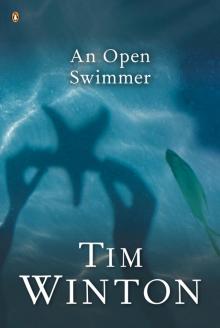 An Open Swimmer
An Open Swimmer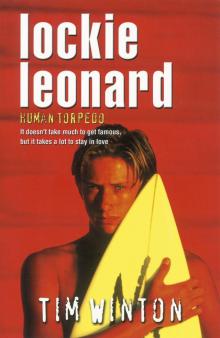 Human Torpedo
Human Torpedo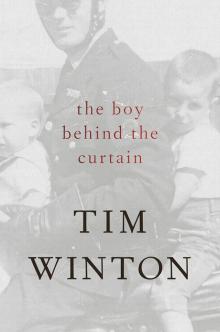 The Boy Behind the Curtain
The Boy Behind the Curtain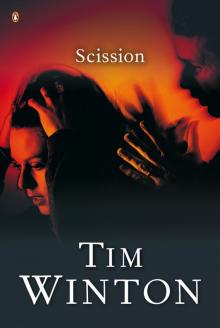 Scission
Scission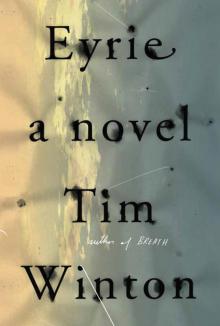 Eyrie
Eyrie Island Home
Island Home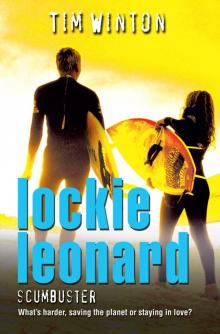 Scumbuster
Scumbuster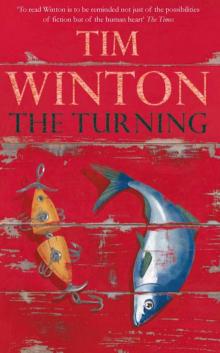 The Turning
The Turning Legend
Legend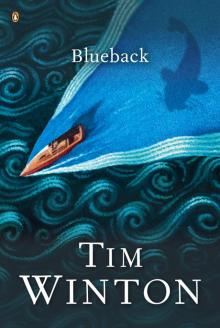 Blueback
Blueback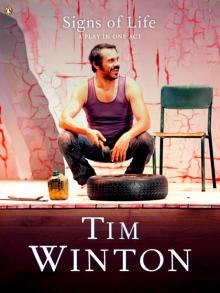 Signs of Life
Signs of Life Breath
Breath Land's Edge
Land's Edge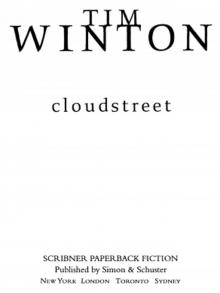 Cloudstreet
Cloudstreet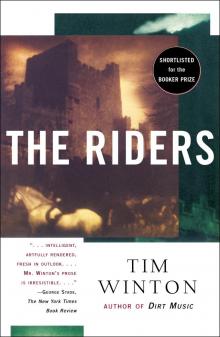 The Riders
The Riders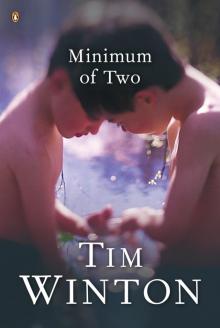 Minimum of Two
Minimum of Two Shallows
Shallows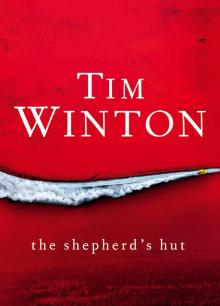 The Shepherd's Hut
The Shepherd's Hut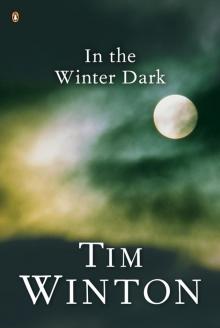 In the Winter Dark
In the Winter Dark